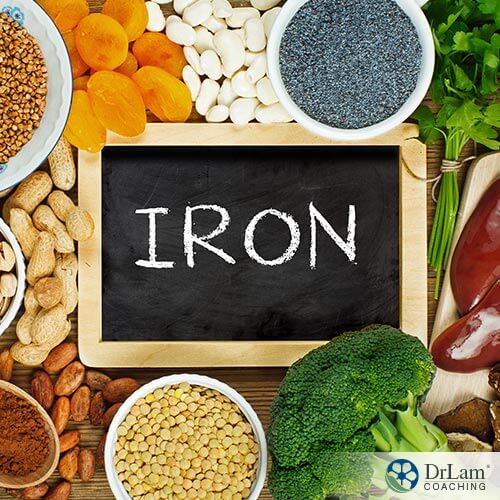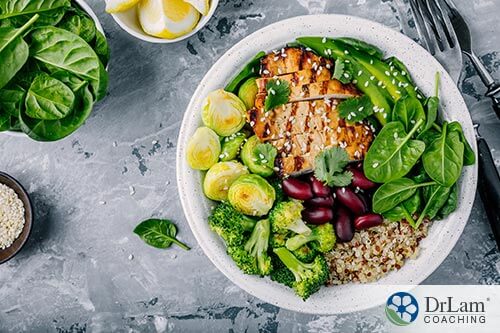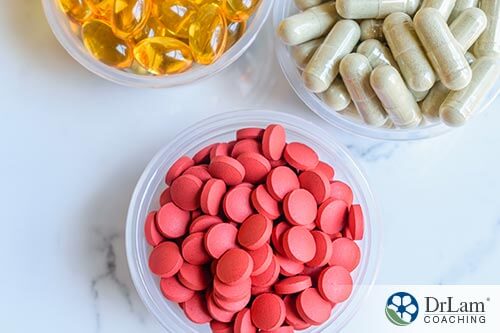
 Your body requires countless vitamins and minerals to function correctly. Most of these elements come from the food you eat, but if you’re not eating a balanced diet you may be missing out on some of the essential building blocks of life. Iron is a particularly important mineral and is absolutely essential for every system in your body. Therefore, an iron deficiency can have serious consequences on your health and wellbeing. So if you have any of the signs or symptoms of an iron deficiency, it’s important to seek out good advice on boosting iron levels so you your body can return to its optimum state and you can start enjoying your life again.
Your body requires countless vitamins and minerals to function correctly. Most of these elements come from the food you eat, but if you’re not eating a balanced diet you may be missing out on some of the essential building blocks of life. Iron is a particularly important mineral and is absolutely essential for every system in your body. Therefore, an iron deficiency can have serious consequences on your health and wellbeing. So if you have any of the signs or symptoms of an iron deficiency, it’s important to seek out good advice on boosting iron levels so you your body can return to its optimum state and you can start enjoying your life again.
Iron is a mineral found in a range of different foods. Despite this, it is one of the most commonly reported deficiencies in the world. An iron deficiency can have a number of implications on your health and quality of life, which is why boosting iron levels is so important for your overall health. Iron is an important part of hemoglobin, a substance found in red blood cells that transports oxygen around the body. Approximately two thirds of the body’s iron is used in this way and if you don’t take in enough iron, your body can’t make enough red blood cells and therefore, can’t get the oxygen it needs to function—this is known as iron deficiency anemia. Iron is an essential element used in creating every cell in your body, and also keeps your skin, hair, and nails healthy.
Iron deficiencies can occur in anyone, from babies to older people, although women are particularly at risk of developing this condition. There are three primary causes of iron deficiency. The first is your diet. If you don’t eat a sufficient variety of foods it’s very easy to miss out on essential vitamins and minerals, including iron. Iron is mostly found in meat or fish, so a vegan or vegetarian diet can lead to low iron levels. However, this type of deficiency is most commonly caused by fad diets that restrict certain foods or poor eating habits that don’t include the variety of foods your body needs to be healthy.
The second cause of iron deficiency is blood loss. This may be the result of injury or illness, or can simply be due to bleeding associated with menstruation or childbirth. If you don’t take steps towards boosting iron levels during or after these events, it can result in a deficiency. Pregnancy itself is a risk factor because pregnant women need double the normal amount of iron to facilitate growth of the fetus, but may not be able to eat enough of the right kinds of food to meet this need.
The final cause of an iron deficiency can be an inability to actually absorb iron properly. Certain intestinal disorders such as coeliac or Crohn’s disease can result in the difficulties absorbing iron, as can intestinal surgery. If you have this problem, it doesn’t matter how much iron you actually eat, your body won’t absorb it and medical intervention is required to address the problem.
 Iron deficiencies can range from mild to severe, and often a low-level deficiency has no obvious symptoms. However, as the condition progresses it can lead to iron deficiency anemia, which does have some very obvious and detrimental symptoms. Anemia can pose a serious threat to your health because it means your body does not have enough iron to create the right number of red blood cells. If this occurs, your body becomes fatigued since there isn’t enough oxygen circulating through your system, and tiredness is often the first symptom of an iron deficiency that people notice. This fatigue goes beyond simple tiredness and can actually depress your immune system making you more prone to infections, as well as affecting your skin, hair, and nail health.
Iron deficiencies can range from mild to severe, and often a low-level deficiency has no obvious symptoms. However, as the condition progresses it can lead to iron deficiency anemia, which does have some very obvious and detrimental symptoms. Anemia can pose a serious threat to your health because it means your body does not have enough iron to create the right number of red blood cells. If this occurs, your body becomes fatigued since there isn’t enough oxygen circulating through your system, and tiredness is often the first symptom of an iron deficiency that people notice. This fatigue goes beyond simple tiredness and can actually depress your immune system making you more prone to infections, as well as affecting your skin, hair, and nail health.
If you have iron deficiency anemia, you may notice the following symptoms:
 Fatigue is the most common symptom of an iron deficiency and is also the main symptom of Adrenal Fatigue Syndrome (AFS). Adrenal Fatigue is a stress related disorder that occurs when you’ve been under a lot of stress for a prolonged period of time. The body is designed to deal with stress by activating the NeuroEndoMetabolic (NEM) stress response system, which is a series of systems that make slight alterations in your body to help you cope with stress. However, if stress is prolonged, your adrenal glands can become fatigued and stop functioning as well as should. This often results in a series of baffling and confusing symptoms such as fatigue, memory problems, and weight gain.
Fatigue is the most common symptom of an iron deficiency and is also the main symptom of Adrenal Fatigue Syndrome (AFS). Adrenal Fatigue is a stress related disorder that occurs when you’ve been under a lot of stress for a prolonged period of time. The body is designed to deal with stress by activating the NeuroEndoMetabolic (NEM) stress response system, which is a series of systems that make slight alterations in your body to help you cope with stress. However, if stress is prolonged, your adrenal glands can become fatigued and stop functioning as well as should. This often results in a series of baffling and confusing symptoms such as fatigue, memory problems, and weight gain.
Because the symptoms of low iron levels can be similar to the symptoms of AFS, this can cause problems with diagnosis. Doctors are trained to treat the symptoms of a disease, which means they will often prescribe an iron supplement to treat your anemia without looking any deeper. But boosting iron levels with this type of treatment won’t cure all your symptoms if your adrenal glands are the root cause of your fatigue. Many doctors don’t recognize the importance of the adrenal glands in regulating stress or the problems they can cause when they become fatigued. So if traditional treatments for iron deficiency don’t work, it’s important to consider whether AFS could be the underlying cause.
An iron deficiency causes a great deal of stress on your body. Since it lowers your resistance to infection, this means you’ll probably get sick more often and find it more difficult to recover. It also causes fatigue and weakness, which make daily activities difficult and strenuous. In addition, an iron deficiency can cause panic attacks, which are debilitating periods of fear and anxiety. All of these side effects can increase the stress load on your body and overload your adrenal glands, either causing or exacerbating AFS. Therefore, if you’re iron deficient, it’s extremely important that you talk to your doctor about boosting iron levels to decrease the stress on your adrenal glands and avoid further complications associated with AFS.
 AFS isn’t directly related to your iron levels, but can cause further complications if you already have an iron deficiency. This is due to the fact that one of the symptoms of AFS for women can be changes in their menstrual cycle—including periods that are unusually heavy or stop halfway through only to resume again around the time they were supposed to finish. This disruption to your natural cycle can cause more blood loss than usual, depleting iron levels even further. This can cause even more stress on the body, and in turn, can worsen the symptoms of AFS. If you are suffering from Adrenal Fatigue, it’s important to get your iron levels checked as soon as possible and if you have a deficiency, take necessary steps to eliminate the issue.
AFS isn’t directly related to your iron levels, but can cause further complications if you already have an iron deficiency. This is due to the fact that one of the symptoms of AFS for women can be changes in their menstrual cycle—including periods that are unusually heavy or stop halfway through only to resume again around the time they were supposed to finish. This disruption to your natural cycle can cause more blood loss than usual, depleting iron levels even further. This can cause even more stress on the body, and in turn, can worsen the symptoms of AFS. If you are suffering from Adrenal Fatigue, it’s important to get your iron levels checked as soon as possible and if you have a deficiency, take necessary steps to eliminate the issue.
The amount of iron you need will vary throughout your life. Children in particular need more iron to facilitate their growth and development. Most sources claim children should be getting around 10 mg per day between the ages of 4 and 8, but this decreases as they get older and only around 8 mg is required per day between the ages of 9 and 13. It’s extremely important to make sure children don’t overdose on iron supplements, as this could be fatal. To avoid this, they should be able to get all the iron they need from food, and if there is a problem with their iron levels, consult a doctor immediately. Women also need more iron due to their menstrual cycle and should make sure they’re getting about 18 mg a day. In comparison, most men only need around 8 mg a day to stay healthy. If you’re not getting the right amount of iron for your particular needs, make sure you talk to your doctor about boosting iron levels naturally and safely.
Eating the right types and a variety of different foods is the best way of boosting iron levels and ensuring a healthy body. Most people seem to believe that meat is the only source, or even the best source of iron, but this simply isn’t the case. In fact, some sources claim those on vegetarian diets are less likely to be iron deficient because of the focus on green, leafy vegetables. Iron can be found in a variety of foods including the following:
If your iron deficiency is caused by a poor diet, it’s important to take steps to correct this. The most natural way to increase the level of iron in your body is through your diet, and the safest method too. Talk to your doctor about improving your diet and consult a nutritionist or dietitian, if necessary. They will help you find the right balance of iron and other essential nutrients that is right for your body and your current health status.
 If you have trouble stabilizing your iron levels through dietary changes, it may be necessary to try supplementation. An iron supplement, such as Ferritin+ can give you a concentrated boost of this essential mineral, but it may also have consequences. Make sure your doctor monitors your iron levels while you’re taking supplements to ensure they don’t increase too much. Excess iron can have a number of negative effects, including vomiting or diarrhea, as well as some more serious consequences.
If you have trouble stabilizing your iron levels through dietary changes, it may be necessary to try supplementation. An iron supplement, such as Ferritin+ can give you a concentrated boost of this essential mineral, but it may also have consequences. Make sure your doctor monitors your iron levels while you’re taking supplements to ensure they don’t increase too much. Excess iron can have a number of negative effects, including vomiting or diarrhea, as well as some more serious consequences.
With supplements, an iron overdose is serious and very real possibility. It can be fatal for children, so make sure you keep your supplements out of reach at all times. In adults, the effects are usually less serious because the body has fully developed systems to regulate iron absorption. However, if you have an inherited condition called hemochromatosis, your body may be unable to properly limit your iron absorption. In this case, iron can be deposited on your liver, kidneys, or heart and may cause a variety of serious and life threatening conditions. This is why you should always see your doctor before attempting to treat your iron deficiency with supplements.
If you have AFS, too much iron can also negatively affect your adrenal glands. These are the most important part of the NEM stress response, as they secrete up to 50 hormones that help your body deal with stress. Too much iron in your system can result in Adrenal Fatigue and a combination of other symptoms, such as low blood pressure and weakness—yet another reason to carefully monitor any form of iron supplementation.
To enjoy optimum health and function, you need adequate amounts of iron in your diet. This essential mineral helps transport oxygen around your body and also helps fight off infections and illness. Adrenal Fatigue may be worsened by an iron deficiency, leading to a host of negative effects and resulting in more stress on your already stretched systems. Adrenal Fatigue also causes symptoms like increased blood loss through menstruation that can exacerbate or lead to an iron deficiency, so it’s important to compensate for these issues.
An iron supplement we recommend is Ferritin+. It is made from a natural iron source common in legumes. In this instance, this protein-coated iron is derived from peas. Interestingly, iron from legumes like peas tends to help address digestive disorders. This is because this type of slow-release iron is easily absorbed. As a result, Ferritin+ may help your body to maintain balanced iron levels, increase your energy levels, and contribute to the production of red blood cells.
Iron deficiencies are actually quite common—probably due to poor eating habits and fad diets—which makes boosting iron levels absolutely essential if you want to improve your overall health and wellbeing.
Iron has a number of essential functions in your body. It’s used to create red blood cells, which carry oxygen through your system and it’s also used in creating every cells in your body. If you’re deficient, you will suffer from extreme fatigue as well as a host of other symptoms.
